I have a simple JNI function which I use to read data from file into byte[] from C code UnixUtil.unsafeReadToByteArray which is implemented as:
JNIEXPORT jlong JNICALL Java_net_xxxxxxx_UnixUtil_unsafeReadToByteArray
(JNIEnv *e, jclass jc, jint fd, jbyteArray array, jlong offset, jlong count){
signed char *array_native_ptr = (*e) -> GetByteArrayElements(e, array, NULL);
ssize_t bytes_read = read(fd, array_native_ptr + offset, (size_t) count);
(*e) -> ReleaseByteArrayElements(e, array, array_native_ptr, 0);
return bytes_read;
}
Profiling a java application running the function showed up some unclear result. Here is the top:
One of the hottest thing turned out to be some instruction by address 0x18eb1f which is from libc-2.27.so. I wanted to understand what it was but gdb does not know about it
(gdb) disas 0x18eb1f
No function contains specified address
Objdump'ing libc to grep the address I found that
18eb0b: 72 0f jb 18eb1c <__nss_group_lookup@GLIBC_2.2.5+0x24ddc>
[...]
18eb1c: 48 89 d1 mov %rdx,%rcx
18eb1f: f3 a4 rep movsb %ds:(%rsi),%es:(%rdi)
Which looks like it is a part of __nss_group_lookup while __nss_group_lookup seems not to contain the address:
(gdb) disas __nss_group_lookup
Dump of assembler code for function __nss_passwd_lookup:
0x0000000000169d40 <+0>: mov rax,QWORD PTR [rip+0x281121] # 0x3eae68
0x0000000000169d47 <+7>: mov DWORD PTR fs:[rax],0x26
0x0000000000169d4e <+14>: mov eax,0xffffffff
0x0000000000169d53 <+19>: ret
End of assembler dump. making the things more unclear then it was before.
making the things more unclear then before.
Question: Can you give any hint where to look at to understand why is the instruction belonging to __nss_group_lookup is the hottest while calling to jni_GetByteArrayElements/jni_ReleaseByteArrayElements and what it actually is.
My expectation was since jni_GetByteArrayElements/jni_ReleaseByteArrayElements copies the byte[] from Java heap to C heap via memcpy it would be the hottest one.
